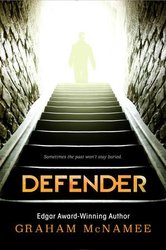Defender is Edgar Award-winning author Graham McNamee’s latest book, so it features a mystery plot, but McNamee also performs some genre-blending to create a sports story with some psychological thriller elements, as well.
is Edgar Award-winning author Graham McNamee’s latest book, so it features a mystery plot, but McNamee also performs some genre-blending to create a sports story with some psychological thriller elements, as well.
With its focus on the ugly effects of anger and on hiding family secrets, Defender frequently reminded me of Hidden Roots by Joseph Bruchac. Although Bruchac’s book doesn’t carry the sports angle and McNamee’s doesn’t develop the theme of awareness of ancestral heritage as a key in shaping identity, both novels feature protagonists who learn that life doesn’t work well when lived in hiding and that “never tell” is not a healthy family motto. As the terrible, unbelievable parts of their pasts that had been carefully hidden for years begin to unfold, both Howard Camp from Hidden Roots and Tyne Greer from Defender learn the value of family–that family grounds us, supports us, and helps us stand against life’s turbulence.
Defender’s protagonist, Tyne is a 6’6” senior whose nickname is Girlzilla because she has “the bone structure of a Viking giant” (9). Although she doesn’t like the stares she gets or being mistaken for a guy, she likes being on the basketball court where her size matters, where she can defend her team by shot blocking, rebounding, and muscling opponents out of the way. During a particularly tense game against a private school, Tyne goes up for a slam dunk; she had the speed, the jump, and the elevation perfect, but when she landed off-balance where the court was slippery with sweat, her right leg buckled and she hyperextended her knee, shredding her MCL. Now, she’s convalescing and rehabilitating with vigor because she sees basketball as her way out, as her escape from the Zoo and the family business, which she doesn’t want to inherit.
Although Tyne’s dad, Ted Greer, is her trainer, motivator, and superfan, he’s also the superintendent of their high rise housing complex in Toronto, the provincial capital of Ontario, Canada. In this slum tower called the Zoo—where Tyne lives with her climbing, pouncing, bouncing little brother Squirrel and with her protective, feisty mother—every floor has its dramas, scandals, and heartbreaks. The building’s previous superintendent, Mad Dog Doug, was Ted’s father, a “beautiful, rotten, miserable man [who] was wired wrong in his head, more than just violent” (164). So, when Tyne discovers the mummified body of a dead girl in the basement of the building while she’s helping her dad during Christmas break, she isn’t sure who is responsible: her violent grandfather, who beat his own wife and children; Sam Savard, the building’s owner; her teddy bear of a father; or some other murderer. Her curiosity spikes when her dad tells her there was no body, that her pain medication must have induced hallucinations.
With the help of her boyfriend, Ricky—aka Stick—Tyne embarks on a detective’s mission, asking questions and chasing questions to find answers and to solve the mystery of the dead girl. Celia, the oldest resident in the Zoo, warns Tyne: “Sometimes it’s better to be left with questions. Because you might not like the answers” (117).
As the answers come, Tyne and Stick realize that solving mysteries is “not like the movies. When it’s for real, sometimes the bad guy wins” (205). Although Tyne isn’t tiny, she realizes her towering frame isn’t enough to guard against bullies, and her vow to be a defender of those smaller and in need of protection may in fact compromise her own life and her family’s safety.
McNamee’s book is filled with fascinating turns and with intriguing glimpses into a mind twisted by anger.
- Posted by Donna
